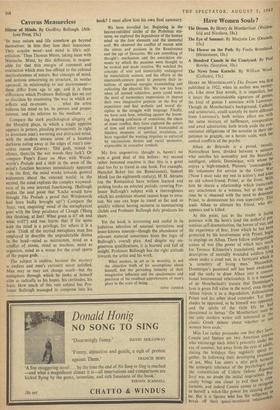Caverns Measureless
Mirror of Minds. By Geoffrey Bullough. (Ath- lone Press, 35s.) 'IN man nature and life somehow go beyond themselves; in him they lose their innocence. They acquire mind—and mind is life's self- criticism.' Thus Thomas Mann, taking issue with Nietzsche. Mind, by this definition, is respon- sible for that thin margin of comment and evaluation which man has affixed to the colossal inarticulateness of nature. But concepts of mind, and notions concerning its structure, its modus operandi, its relationship to our environment— these differ from age to age, and it is these differences which Professor Bullough has set out to elucidate by examining 'the way in which art
reflects and re-creates . . what the artist believes his mind to be, its powers and proper interest, and its relation to his medium. . .
Compare the stark psychological allegory of the Morality plays, in which a single appetite appears in person, pleading persuasively its right to dominate man's wavering and distracted mind, with the modern uneasy sense of a haunted darkness eating away at the edges of man's con- scious reason (Graves: 'Old gods, tamed to silence, there/In the wet woods they lurk'). Or compare Pope's Essay on Man with Words- worth's Prelude and a shift in the sense of the mind's function becomes immediately apparent —in the first, the mind works towards general statements about the external world; in the second, the mind explores the complex wayward- ness of its own internal functioning. (Bullough makes the neat point that 'Locke would have thought The Prelude a proof that Wordsworth had been badly brought up!') Compare the 'busy, vast, enquiring' mind of the metaphysical poet with the limp petulance of Clough ('Hang this thinking, at last! What good is it? oh and what evil?') and one learns that if for some men the mind is a privilege, for others it is a curse. Think of the myriad metaphors man has employed to describe the unpredictable drama in the head—mind as microcosm, mind as a conflict of atoms, mind as machine, mind as organism, mind as a venue for the cruel sports of the pagan gods. . . .
The subject is endless, because the mystery is endless and man's curiosity never satisfied. Man may or may not change much—but the metaphors through which he looks at himself alter as radically as his hopes, his certitudes, his fears. How much of this vast subject has Pro- fessor Bullough managed to compress into his
book? I must allow him his own final summary.
We have travelled far. Beginning in the heaven-enfolded circles of the Ptolemaic uni- verse, we explored the dependence of the human mind on the four elements and the immortal soul. We observed the conflict of reason with the senses and passions in the Renaissance and the age of Descartes. We saw something of thought's mechanism and the associative ele- ments by which the passions were thought to be evoked and made creative. We watched the concepts of soul and immortality endangered by materialistic science, and the efforts of the nineteenth-century poets to preserve their in- tuitions of spiritual energies transcending and outlasting the physical life. We saw too how, when all seemed subjective, poets could make the most of momentary impressions or impose their own imaginative patterns on the flux of experience and find esthetic and moral dis- cipline in the struggle with language. Finally, we have seen how, rebelling against the boom- ing, buzzing confusion of sensations, the chaos of inner conflict, they have explored the nature of time and either imagined it transcended in timeless moments of spiritual revelation, or have regarded the warring impulses as enforced by unconscious desires and racial memories, expressible in evocative symbols.
My first ungenerous thought is, haven't we seen a good deal of this before: my second rather bemused reaction is that this is a great deal too far to travel in one book. For example, Herschel Baker (on the Renaissance), Samuel Monk (on the eighteenth century), M. H. Abrams (on the Romantics) have written learned and probing books on selected periods, covering Pro- fessor Bullough's subject with a thoroughness which his ambitious résumé cannot hope to emu- late. No one can hope to travel so far and so quickly without having recourse to summarising clichés and Professor Bullough duly produces his share.
Yet the book is interesting and useful in its judicious selection of unusual quotations and lesser-known sources—though the abundance of relevant material sometimes blurs the logic of Bullough's overall plan. And despite my un- generous qualifications, it is learned and full of insight. Professor Bullough has the right attitude towards the artist and his work.
What matters, in art as in morality, is not the objective truth of his assumptions about himself, but the pervading intensity of their imaginative influence and the spaciousness and precision of his resultant apprehension of man's place in the scale of being.
TONY TANNER






























 Previous page
Previous page